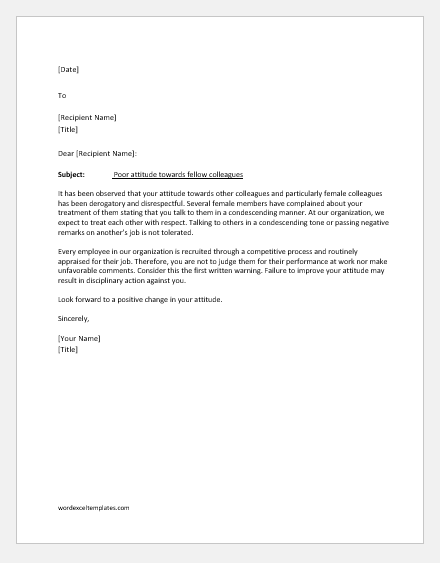Managing employees requires leading skills, proactive behavior and patience. Every employee has a different nature and style of working. A good leader or manager is one who can successfully manage every employee’s capability and direct them towards achieving organizational goals.
Sometimes this job also requires making tough decisions and reprimanding employees. Reprimanding may not be taken in the negative sense; rather it may be seen as a strategy to redirect the employee towards maintaining the organization’s core values.
Sometimes when employees misbehave with supervisors or fellow workers, they may need to be reprimanded if it becomes a habit. Often an employee’s attitude towards his supervisor or his colleagues is not desirable or conformant to organizational values. There are many situations where an employee’s attitude becomes a problem. Here is a list of attitude issues that might require reprimand:
- Using foul language
- Abusing colleagues or subordinates
- Being rude
- Insulting others
- Disregarding other’s feelings
- Making derogatory remarks
- Disregarding supervisor’s instructions intentionally
- Disrespecting minority workers
- Acting superior
- Harassment
- Irresponsible attitude towards work
- The casual attitude at workplace
- Late arrival, punctuality issues
Such behaviors go against the cultural norms of almost every organization that values respect and tolerance. While an instance may be ignored or let by, repeated occurrences may result in complaints against an employee. The supervisor or the HR department are then compelled to take action against the employee, even if they had ignored it in the past.
Employees who act as they know better or their fellow colleagues know nothing may frequently get into trouble, particularly if they are disrespectful or outspoken in their judgments. Similarly, an employee who makes racist comments against minorities of religion or color need to be strictly reprimanded if the organization wants to avoid legal issues and maintain a culturally diverse environment. Moreover, no employee is given the right to outright insult another colleague, or make personal comments on them.
Other than personal attitudes towards others, employees may also have a poor attitude towards work. They may be careless or irresponsible, fail to show up on time or not follow deadlines.
If supervisors are quick to correct employees in their attitude, the situation can be handled before time and with minimal disturbances. Repeated attitude behaviors can lead to warnings and ultimately disciplinary action against an employee.
Sample letter
Dear Mr. Edwards,
Subject: Poor attitude towards fellow colleagues
It has been observed that your attitude towards other colleagues and particularly female colleagues has been derogatory and disrespectful. Several female members have complained about your treatment of them stating that you talk to them in a condescending manner. At our organization, we expect to treat each other with respect. Talking to others in a condescending tone or passing negative remarks on another’s job is not tolerated.
Every employee in our organization is recruited through a competitive process and routinely appraised for their job. Therefore, you are not to judge them for their performance at work nor make unfavorable comments. Consider this the first written warning. Failure to improve your attitude may result in disciplinary action against you.
Look forward to a positive change in your attitude.
Sincerely,

